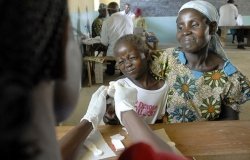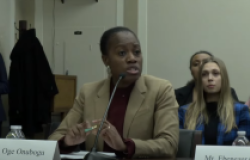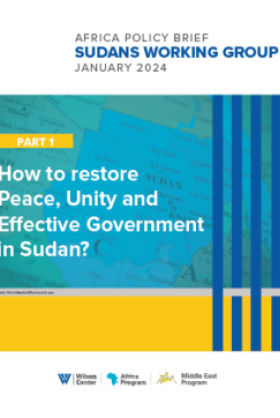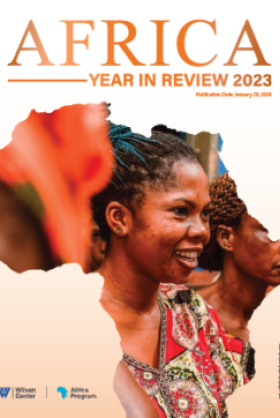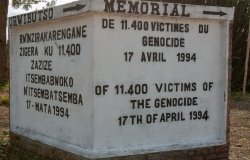The Impact of Trade Liberalization on Poverty Reduction
This spring, the Africa Program joined The Program on Science, Technology, America and the Global Economy to sponsor a day-long conference on the impact of free trade on improving living conditions in the developing world.
The Program on Science, Technology, America and the Global Economy (STAGE), the U.S. Agency for International Development (USAID), and the 3M Company co-hosted a day-long, April 15, 2005 conference exploring the links among trade liberalization, economic growth, and poverty.
The opening panel assessed the current state of research on trade liberalization and its impact on the poor in the developing world. A second panel explored how poor individuals responded to opportunities and adversity created by trade liberalization. The third panel examined how trade liberalization had affected countries in Africa, Asia, Latin America and elsewhere. The final panel wrestled with what lessons research and country experience had for multilateral and domestic policymakers. Sebastian Mallaby, editorial writer and columnist for The Washington Post gave the luncheon keynote address.
Session I - The Basic Links between Trade, Growth, and Poverty
Neil McCulloch, senior poverty economist, World Bank Group, Indonesia, referred to a recent survey of the economic literature he had co-authored with L. Alan Winters and Andrew McKay for the Journal of Economic Literature. Ann Harrison, Professor of Agricultural and Resource Economics, University of California, Berkeley, drew on her recently completed volume, Globalization and Poverty, which was an examination of many of the questions raised by the Winters, McCulloch, and McKay article. The study will be published shortly by the National Bureau of Economic Research.
McCulloch and Harrison found broad agreement in their assessment of how trade liberalization affected economic growth and poverty. In sum, their research showed that trade liberalization had a generally positive effect in stimulating economic growth and that growth often had the effect of reducing overall poverty. Harrison rejected the idea that simple market opening was a panacea and emphasized the reality that liberalizing trade often creates losers as well as winners.
Both argued that the impact of trade was much greater and much more effective if the sound governmental institutions and basic investments in infrastructure and education were in place. Where trade made some part of the poor worse off, they emphasized the need for a safety net that combined income support, access to health care and education. Trade liberalization policies should also be coupled with training and other policies to help the poor move to expanding sectors. Investments can be part of the safety net – McCulloch noted that roads foster mobility and that agricultural extension services can improve the lot of rural farmers.
In his commentary, Bruce Stokes, Trade and International Economics Correspondent, The National Journal, pressed for a better definition of an effective safety net and noted the limited success of trade adjustment assistance in the United States. He also raised a question about which complementary policies were the most important and asked if they should be in place before countries relaxed their formal trade barriers. He also wondered how labor laws would provide flexibility and protection at the same time.
McCulloch and Harrison agreed that trade liberalization should not wait – it was viewed as one of "the biggest bangs for buck" possible in terms of policy changes. Labor concerns were viewed as very important but had to reflect the level of a country's development – for example, European minimum wages would not work in the developing country context. Also, protection of the poor should not rely on following the U.S. approach to adjustment but instead focus on access to the basics, such as health and education.
Session II - How the Poor Respond to Opportunity and Adversity
In the second panel, Thomas Hertel, Professor of Agricultural Economics, Purdue University and Visiting Scholar, World Bank Group, emphasized the limits of country by country research. Instead, he stressed the need to look at both the situation of the poor in different regions of a country and also the specific condition of the poor within the regions. Drawing on his research in Brazil, Hertel divided the country in several distinct regions with their own set of institutions that influenced the ability of the poor to take advantage of trade liberalization or adjust to trade induced adversity.
William Masters, Professor of Agricultural Economics, Purdue University, focused his remarks on the potential for increased trade to affect the condition of the poor. The reduction of barriers to trade in agricultural products (including production subsidies, export credits and high tariffs) will open up opportunities for increased exports from some developing countries. Their ability to take advantage of newly opened markets, however, will depend on having the institutions and infrastructure that will allow the expansion of production and effective marketing of key agricultural crops.
In her commentary, Caren Grown, Director of the Poverty Reduction and Economic Governance Team at the International Center for Research on Women, noted the danger of treating the poor as an undifferentiated whole. In addition to the regional differences stressed by Hertel, she pointed to a number of other possible distinctions. In particular, she stressed the need to think in gender terms. Depending on the situation, trade and globalization can create new opportunities for women but also entail real challenges.
Lunchtime Address
In his keynote address, Sebastian Mallaby spoke about the role of the World Bank Group, an organization seeking to significantly reduce world poverty in the late 20th and early 21st centuries. In addition to writing a weekly column for the Washington Post, Mallaby is the author of the recently published The World's Banker.
Mallaby noted how the World Bank had evolved since its early focus on reconstruction in a Europe devastated by World War II. The subtitle of his book, A Story of Failed States, Financial Crises, and the Wealth and Poverty of Nations, highlights many of the challenges that the World Bank faces in the 21st century. The difficulty of the Bank's mission is now compounded by the rise of global terrorism.
While noting some Bank missteps, Mallaby gave a largely positive view of the Bank's effort to deal with new challenges while keeping its eye on its central mission of fostering development and reducing poverty. He noted how the Bank had responded to criticism about its indifference to ecological damage by dramatically expanding its analytic capacity to assess the environmental impact of development strategies. He also praised the World Bank for its extensive effort to meet with and listen to a variety of non-governmental organizations that have become ever more prominent as advocates for human rights, the environment and the poor.
Session III - Contrasting Country Experiences
In the third panel, speakers addressed specific country experiences with trade liberalization and poverty in Ghana, Bangladesh, Latin America and the Philippines. All emphasized that trade liberalization promoted growth, and that the impact on poverty of the subsequent growth depended on a number of factors.
Theodore Antwi-Asare, a professor at the University of Ghana, emphasized that trade liberalization is important, but that supplementary measures are needed to attract foreign direct investment and infrastructure investment. Ghana's trade liberalization has promoted growth, and in fact Ghana has experienced a 4.5 percent rate of growth in GDP since 1993. Expanded trade may have added 1 percentage point to GDP growth, which in turn led to a 0.33 percent increase in employment.
Debapriya Bhattacharya, Executive Director of Bangladesh's Center for Global Development, noted that liberalization started as a result of pressure from the IMF, as Bangladesh reduced tariffs from an average 300 percent to 32 percent. This led to a four-fold increase in export volume. However, this represented unilateral liberalization by Bangladesh, and the impact would have been greater if Bangladesh's trade partners had also liberalized. The impact on poverty of this trade increase was less dramatic. Rural farmers constituted most of the poor, and they were not affected by unilateral liberalization. Bhattacharya pointed to the Bangladeshi experience as demonstrating the need for both complimentary government policies and multilateral trade liberalization.
Rebeca Grynspan, Director of the United Nations Economic Commission for Latin America and the Caribbean, reviewed Latin America's experience with trade reform. She noted that tariff levels decreased dramatically in the 1980s and 1990s, largely because of trade agreements. This led to an unprecedented increase in exports and foreign direct investment. However, in the crisis of the 1980s, severe economic volatility seriously increased income inequality. As Latin America's economies have recovered, income inequality has not declined and in some cases, has worsened. Grynspan felt that this indicates that the recipe of the "Washington Consensus" needs to be modified to individually fit each country's conditions.
Rosario Guzman, the Executive Director of the IBON Foundation, described the experience in the Philippines. She argued that poverty is a structural problem in the Philippines and that trade liberalization has exacerbated this problem.
In her commentary, Aseema Sinha, a Fellow at the Woodrow Wilson Center and a professor at the University of Wisconsin-Madison, noted that governments need complimentary policies, especially in infrastructure and education, to make the most of trade liberalization and to cushion the impact on the economic losers. Sinha noted that trade liberalization can be internal, too, pointing to the Byzantine trade restrictions and high tariffs between various states within India. Echoing Hertel's comments in Panel II, she suggested that new, comparative studies on countries with similar characteristics but different policies (or vice-versa) would be helpful in determining the effectiveness of national and multilateral development and trade strategies.
Session IV – Challenges for Policymakers
The fourth panel focused on the responses of several bilateral and multilateral development agencies and non-governmental organizations to the earlier presentations that examined the opportunities and complications that often accompanied trade liberalization. According to these panelists, development assistance should be coordinated to truly complement trade liberalization.
Ruth Jacoby, the Director-General for Development Cooperation in the Swedish Ministry for Foreign Affairs, stressed that initial inequality matters to whether trade liberalization will benefit or harm the poor. Therefore, the real need is to strengthen the state and to integrate trade policies and development strategies, both by the recipient and the donor nations. Policy coherence is essential so that both trade and development policies can work together.
She noted that the ultimate goal of a country's trade policy is integration into the global economy. Good governance helps ensure that poverty will be reduced in the process, but rules-based regulations only work if they are enforced. To improve their chances for success, developing countries need market access for critical exports, especially agriculture and fishing.
Gawain Kripke, the Senior Policy Advisor to Oxfam America, called for the recognition of both the opportunities and risks involved with globalization. Trade liberalization can result in gains from trade for developing countries, but it can also impose burdens. He also argued that many trade-related opportunities were being lost. Unilateral steps by the United States to reduce trade barriers could lead to increased imports from the developing world. For example, while France exports $30 billion to the United States and Bangladesh exports only $2 billion, France pays less in tariffs than does Bangladesh. He criticized the brewing subsidy war between the United States and Europe, sure to have developing world casualties.
Kripke also stressed that complementary policies are necessary to protect the potential losers in the liberalization process. Liberalization in agricultural trade affects the food security and livelihoods of poor people, and the costs of opening markets should not be born by the poorest people. Macroeconomic concerns included a nation's loss of tariff revenue and the inherent vulnerability of poor nations to macroeconomic shocks, especially currency fluctuations, such as with the weak dollar.
Kamal Molhotra, the United Nations Development Program's Senior Advisor on Inclusive Globalization, highlighted research that shows that the link between trade and growth is much stronger than the link between trade liberalization and growth. Many high growth countries, such as China and Japan, have had relatively high levels of trade protection. Liberalization and integration into the global economy are the results of trade and economic success; trade and economic growth are not necessarily the results of liberalization and integration.
Subsequently, he questioned the high priority given to liberalization. In some cases, growth is the prerequisite to liberalization. Growth is also more than a matter of sequencing. Countries need to deal with development priorities from the very beginning of their development process.
Finally, institutions matter. Developing countries need policy space to experiment with development models; no one policy fits all countries. The main challenge of the Doha Round is to ensure that rich countries reduce tariffs and subsidies rapidly and unilaterally.
Peter Grant, the Director for Europe, Trade, and the International Financial Institutions in the U.K.'s Department for International Development, spoke of U.K. efforts to make Doha a "development" round. He observed that there were still not enough development advocates in the current trade negotiations.
He advanced several propositions (1) South-South trade has to be expanded, (2) Doha needs to result in improved market access and lower agricultural subsidies, (3) "Aid for trade [liberalization]" is very important in the Doha Round; significant progress can be made by utilizing policies such as the European Union's "everything but arms" proposal, and (4) assistance should focus on advancing technology, promoting infrastructure investment, and offsetting adjustment costs.
Walter North, the Senior Deputy Assistant Administrator in the Bureau for Asia and the Near East of the U.S. Agency for International Development, pointed out that USAID has been working on trade and development since well before the Doha Round, but has stepped up its programs since the assumption of the negotiations. The vision has been to promote open economies and open societies which will be able to take full advantage of a globalizing economy.
He stressed the need for complementary investments to trade liberalization and pointed to the challenges faced by countries such as the Philippines where strong pro-trade policies have been implemented to little improvement for the poor. While the effectiveness of aid is hard to measure, poverty reduction has to be part of a national development strategy.
.
At the end of a day rich in ideas, evidence, and questions for the future, there were broad areas of agreement. First, that trade liberalization in general can be a positive development strategy to foster economic growth and help reduce overall poverty. Second, the impact of trade liberalization is much greater and more effective if there are effective governmental institutions and key investments in place – including strong legal, education and healthcare systems as well as basic infrastructure requirements such as roads and sanitation systems. Third, trade also carries a risk for specific populations; it often involves losers as well as winners. To limit harm to the poor, countries and multilateral development groups need to foster labor mobility and create safety nets that include access to health and education.
Related Program

Africa Program
The Africa Program works to address the most critical issues facing Africa and US-Africa relations, build mutually beneficial US-Africa relations, and enhance knowledge and understanding about Africa in the United States. The Program achieves its mission through in-depth research and analyses, public discussion, working groups, and briefings that bring together policymakers, practitioners, and subject matter experts to analyze and offer practical options for tackling key challenges in Africa and in US-Africa relations. Read more




